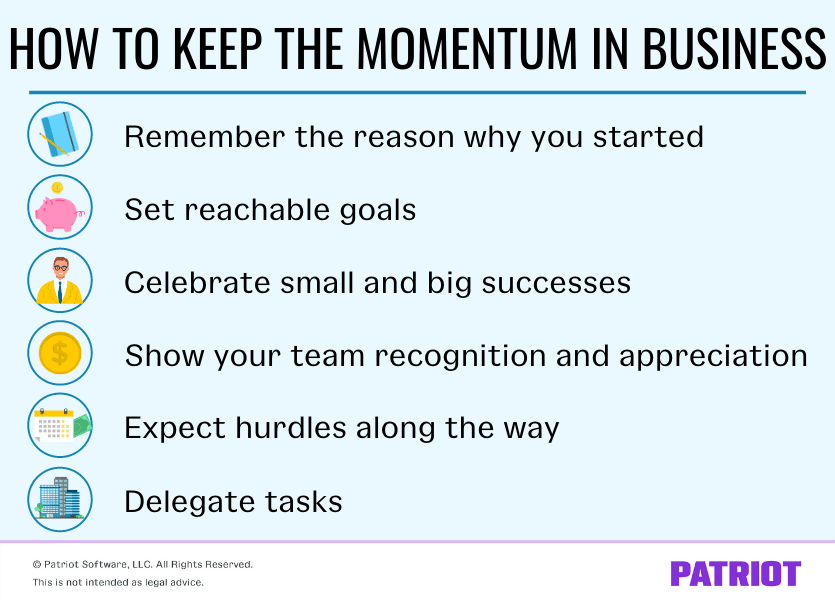When you think about the word “momentum,” you may have flashbacks about your days in science or physics class. Momentum is often defined as mass in motion. But, momentum doesn’t just belong in science. It also has a place in business.
When you have business momentum, tasks get done and goals get accomplished. But when you lose said momentum, your business can begin to slow its roll and lose focus on the big picture. Think of your business as a big mass in motion. Is it keeping the momentum? Or, is it slowly losing its steam?
Keeping the momentum in business
Keeping the momentum going in business can be difficult. Especially when your team is tired and running out of motivation. Maybe you:
- Struggle to say no
- Don’t know how to delegate
- Are easily distracted
- Have lost some of your passion
- Are a procrastinator
To sustain your company’s momentum and keep chugging along, follow the six tips below.

1. Remember the reason why you started
To sustain your business’s momentum, think back to why you started your company in the first place. Chances are, you had (and hopefully still have) a passion for your business and helping others with what you offer.
Focus on this “why” and use it as motivation to keep your business moving forward. Think about your vision for the company and where you want your business to be in the next few years. Sometimes, just thinking back to when you started can give your momentum a boost.
2. Set reachable goals
To keep your company moving forward, you need to set business goals to work towards. The thing is, you don’t want to just set any type of business goals. And, you don’t want to set ones that are impossible to reach anytime soon. Instead, you should set reachable goals for your company.
Reachable goals can be both short- and long-term. Here are a few examples of some attainable business goals:
- Increase customer count to X by 2022
- Reduce business expenses by X%
- Increase website by X%
- Hire X new employees by next year
To reach goals and keep the momentum going, commit to your goals, keep yourself accountable, and set hard deadlines.
3. Celebrate small and big successes
What’s the point of setting goals if you don’t take the time to celebrate your achievements and hard work? To keep your team’s drive going, celebrate small and big victories.
Celebrations don’t have to be elaborate. Maybe you will send out a company newsletter spotlighting a few of the goals you and your team have achieved in the last few months. Or, maybe you want to take the celebration up a notch and treat your employees to coffee or lunch. However you decide to celebrate, make sure the successes don’t go unnoticed.
Once you hit a few of your small business milestones, make sure you keep the momentum going by setting additional (reachable) goals.
4. Show your team recognition and appreciation
A big part of your business’s momentum is your team. Without them, your business wouldn’t be where it’s at today. So along with celebrating victories, make sure you’re showing your team some love, too.
To sustain momentum, show your team you recognize and appreciate their hard work. Like with successes, recognize your team’s achievements in any way you can. Give shoutouts, treat employees with surprises, and most importantly … say thank you. A little bit can go a long way when it comes to recognizing workers for a job well done.
5. Expect hurdles along the way
Challenges are all a part of running a business, right? Right. You knew when you signed up for this whole “starting a business” thing that there would be hurdles along the way. But, it’s how you react to those challenges that impact your business’s success and momentum.
Instead of letting challenges stop you in your tracks, embrace them with open arms. Expect challenges along the way and take them one step at a time. The more challenges you face and overcome, the stronger your business will get. And, the more motivation your company will have to keep the momentum going.
6. Delegate tasks
If you want to build up your business’s momentum, you have to be willing to let go of handling some tasks yourself and delegate them to others.
How do you handle delegation at your business? According to one study, 35% of people said delegation is something they need to work on. If you’re part of this percentage, consider delegating some of the following tasks to other team members:
- Accounting
- Payroll
- Email marketing
- Data entry
- Administrative tasks (e.g., scheduling meetings)
To prevent burnout and get some tasks off of your plate, delegate as much as you possibly can. That way, you don’t take on too many tasks at once and can focus on your business. Plus, it gives other team members an opportunity to keep their own momentum going by learning something new and growing. So, it’s a win-win.
This is not intended as legal advice; for more information, please click here.



